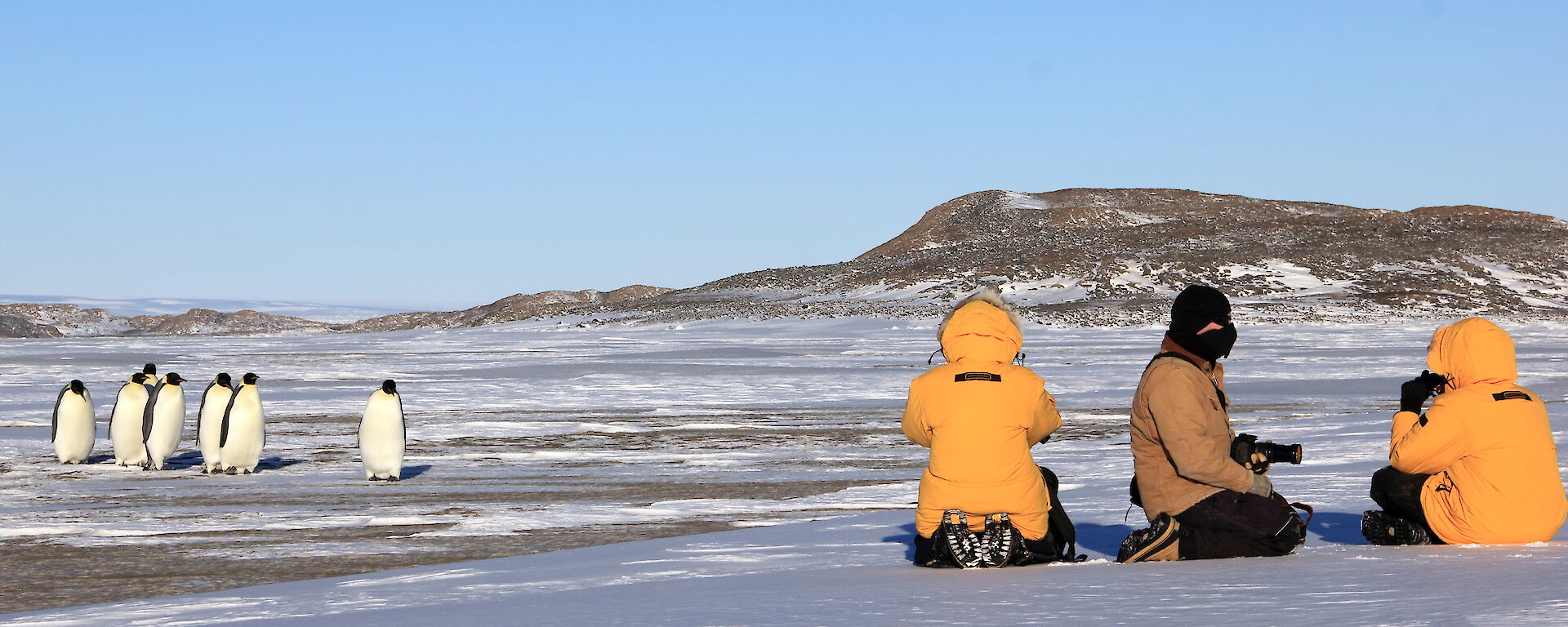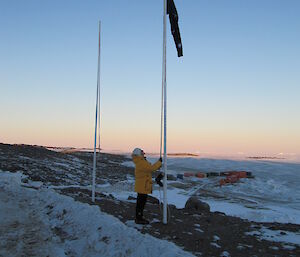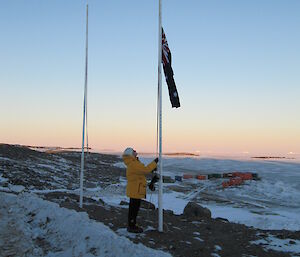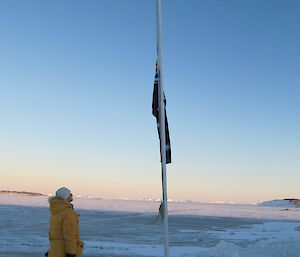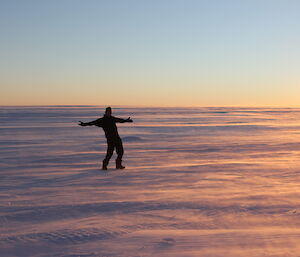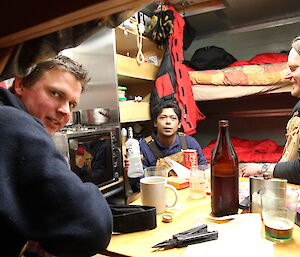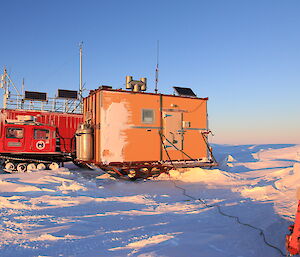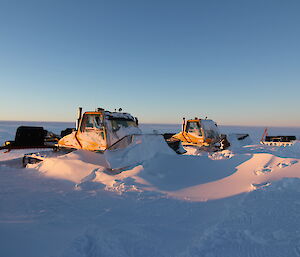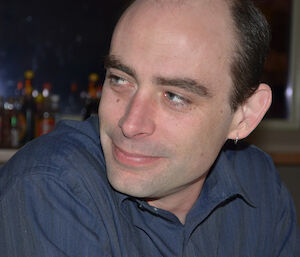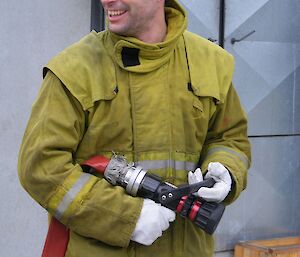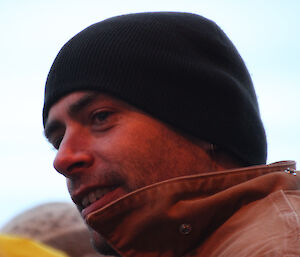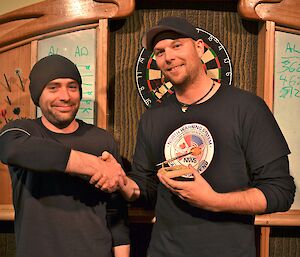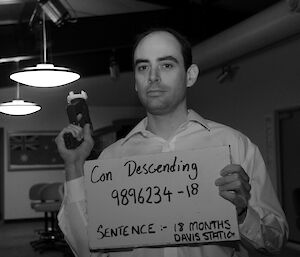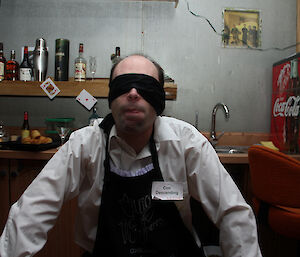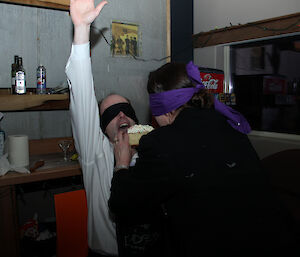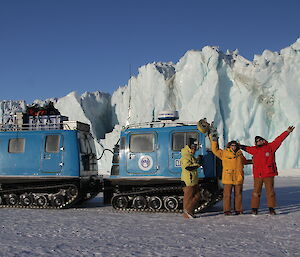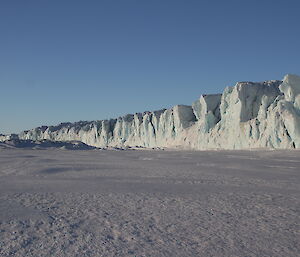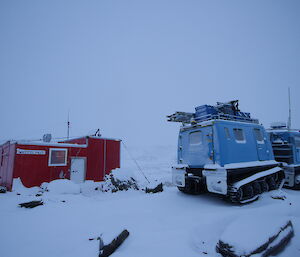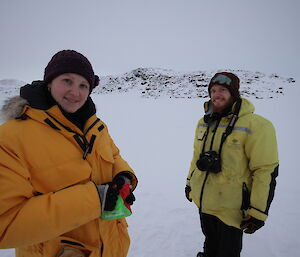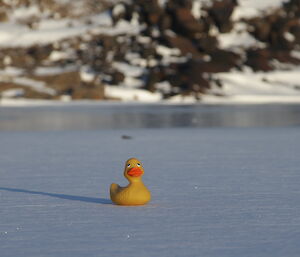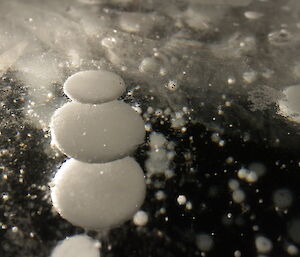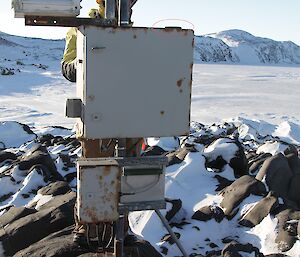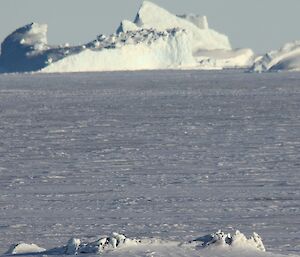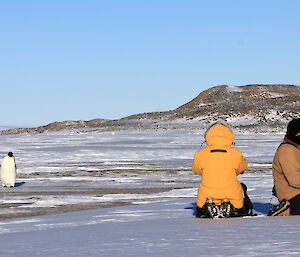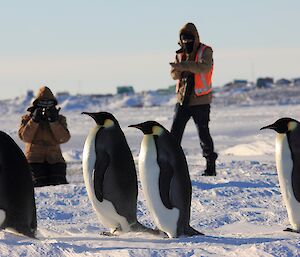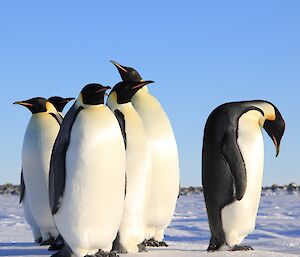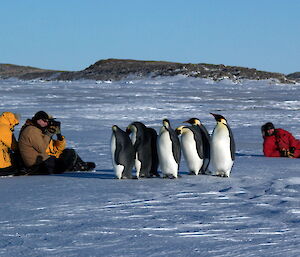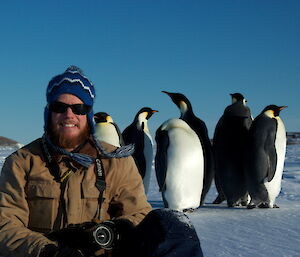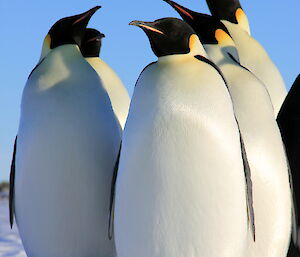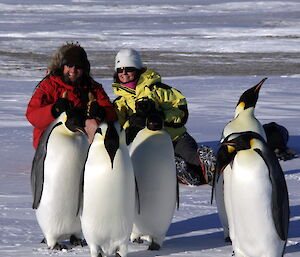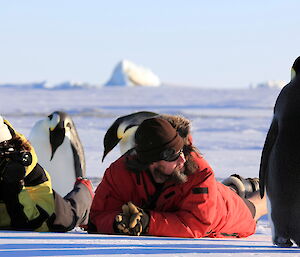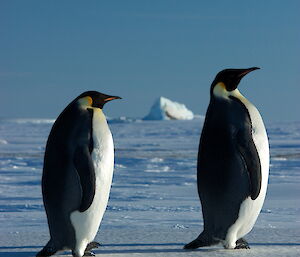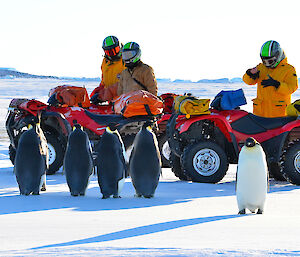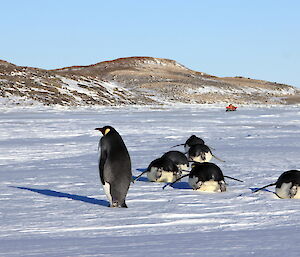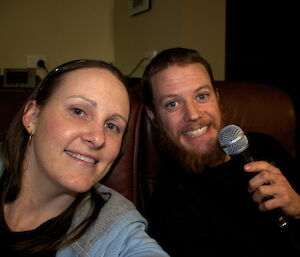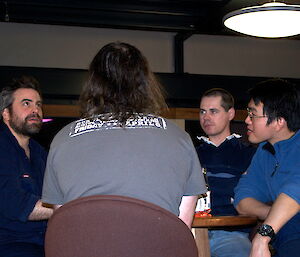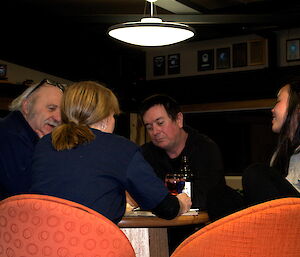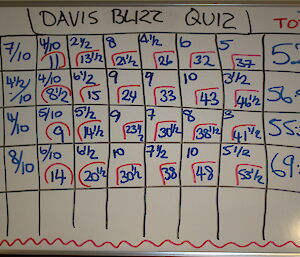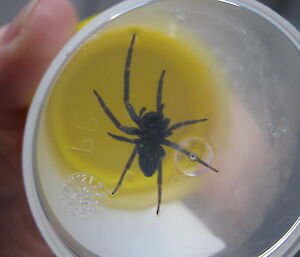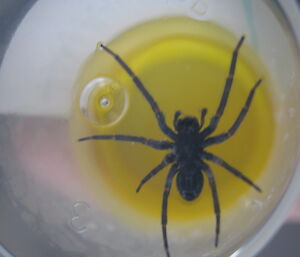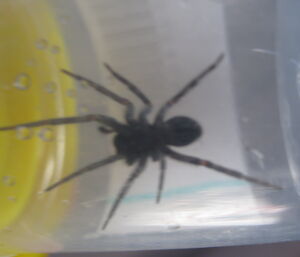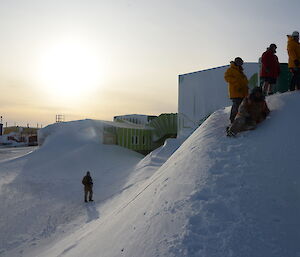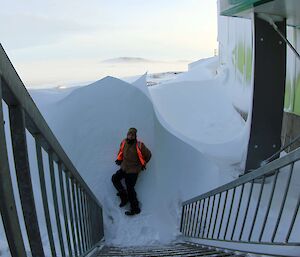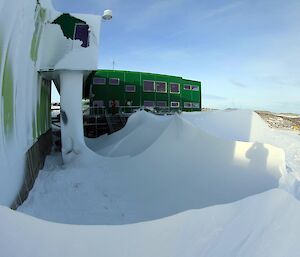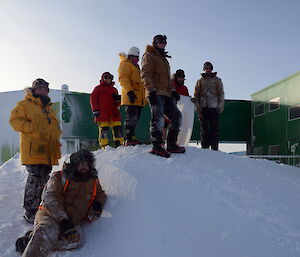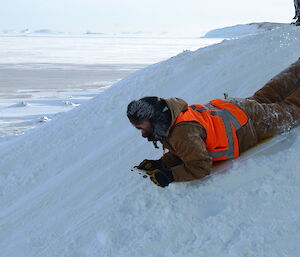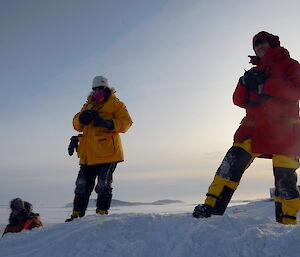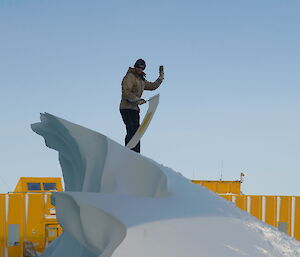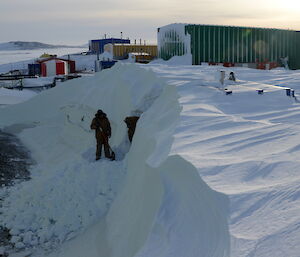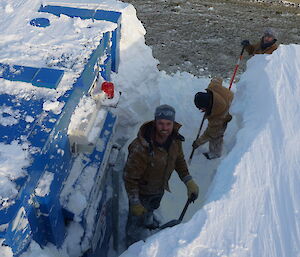We acknowledge the ultimate sacrifice paid by Australian soldiers recently killed in the service of their country.
This week at Davis: 31 August 2012
Woop Woop recovery
Neither wind nor snow could deter these weathered few pioneers. Scott Beardsley, Chris Hill, Jose Campos and Joe Glacken ventured out last week to what some would call the ‘final frontier’ of Davis station, a place called Woop Woop. It is positioned about 50km from station along a waypointed route up onto the plateau (our part of the East Antarctic Ice Sheet). In other words. ‘no-man’s-land'.
Woop Woop is the site of one of the summer skiways for Davis, and also for the machines used to build the skiway each year. This team were tasked with recovering the vehicles left at the end of last summer. Not man nor god had paid much attention to them since then so needless to say the machines needed much TLC before they could be started and sent home to Davis station where they would be serviced and prepped for the next summer season that is fast approaching.
Their tracks were filled with compacted snow that was frozen to the ice plateau itself. Batteries were depleted in the > minus 30 degree environment. Electronics all frosted. Exhausts were full of snow as were engines and fans. In fact, every gap or crevice on any part of these machines was FULL OF SNOW.
To these battle-hardy men it was just another day in paradise. Minus 30 degrees C and blizzard conditions were no worries to them. The frosted and frozen machines were dug clear in a matter of days (six to be exact) with each member of the team pushing through the extreme elements. Wind, ice, snow and more wind, pausing to wipe the icicles gathered upon their brows. Nothing could deter them.
The machines are now back on station ready to be serviced and will live to push out another skiway. The battle-hardy men, are now showered, shaved, and may never, ever, go back to dig another machine out from Woop Woop again.
Doc’s Dozen with Adam Christensen
Climate Processes and Change electronics engineer / emergency response team / darts master
Adam, how many trips south have you done and what do you love about Antarctica?
This is my second trip south, I was here at Davis for summer/winter/summer in 2009/10/11 and I am doing another summer/winter/summer stint now. There’s a lot to like, you get to meet really interesting people from all sorts of different backgrounds and explore this incredible place, but the thing I missed most when I was home was the sky, there is always something going on (spectacular sunrises/sunsets/aurora/stars) and it’s always changing.
What is it like being the electronics engineer here, and if not an engineer what else would you do?
Being the electronics engineer here is not bad at all. I think I have the best job on station. We have a lot of different projects that we support and equipment to maintain so it is a pretty varied role and quite a bit of the work is out in the field. I pretty much decided on Electronics Engineering when I was in year 10 and haven’t looked back. I wouldn’t mind being a chippie. I like working with timber.
What has been your best experience in Antarctica so far Adam?
Tough choice, if I had to pick one, it would be flying back from the Amery Ice Shelf late in the evening with the sun really low on the horizon, lighting up the icebergs with the colours of the sunset.
Who inspires you?
Geoff Brealey. When Chuck Norris is feeling a little lost, he asks himself, “What would Geoff Brealey do?” (I would love to meet this living legend!)
What have you learnt about living in our little Davis family over the winter Adam?
Whatever you do don’t mix up the dessert spoons and soup spoons!
Now Adam, if you were a car, what would you be?
I’m going to go with the slushy ute, not the prettiest thing around but it gets the job done.
Adam, you spend a lot of time out at the radar antenna farm hut, do you have a better coffee machine out there?
Nope, no coffee machine. The atmospheric radars are a significant part of our work down here, they may not be as photogenic as the LIDAR but they can run 24/7 (well, excluding when I am tinkering with them) taking atmospheric measurements from 2km up to over 100km.
I have noticed that you are a bit of a night owl Adam. Does that get confusing during the winter when there is no sun?
If anything, I find the 24 hour daylight in the summer more confusing than the darkness in winter.
What is your favourite bit of equipment here and why?
Definitely not the Häggs, they break too easily, (…just with some people Adam) so I guess it is the quads; the older 350s, not the 420s.
You were the runner up in the Davis Darts Competition this year. Are your dart skills the product of a misspent youth?
Misspent adulthood actually. It wasn’t until my first trip south that I started playing darts.
Davis station is actually situated on the Ingrid Christensen Coast of Antarctica, is this just a freaky coincidence Mr Christensen or is there some other purpose to your very prolonged and repeated trips to Antarctica?
Darn, my hitherto carefully concealed plan to reclaim this territory in the name of my ancestors has been revealed!
What is in store when you return home Adam?
Absolutely no idea, I’ll worry about that when I get home.
Adam, it has been a delight getting your insights into the life of the electronics engineer here. I do apologise for ruining the first step in your quest for world domination, however I believe that the Danes are more than happy having Mary, Crown Princess of Denmark.
Wandering to Watts
Our intrepid explorers have been at it again. Darryl, Steph and Greg went on a three day trip with the intention of going to Omega Cove, Watts Hut, Rubber Duck Lake and Lake Druhzby with a work trip up to Tarbuk Crag to check on the repeater.
We did get to Rubber Duck Lake.
Day three was to have been the climb up Tarbuk Crag, but the weather continued to deteriorate and ruled out this option and we decided to go home. A quick stop off at Ellis Narrows located the lens cap exactly where it was in the photo (although covered in two inches of snow by this stage). :) This capped off what was otherwise an underwhelming successful trip. A good time was had by all.
Animal encounters I: emperor penguins
This Monday brought us another unusual diversion. Around lunchtime a group of seven emperor penguins was spotted on the sea ice about a kilometre off station. They were coming from the east, slowly but steadily making their way to the west, maybe heading towards the emperor penguin colony at Amanda Bay, which is about 100km away from here.
At Davis we are lucky enough to have large colonies of Adelie penguins over summer, but during winter there is hardly any wildlife around and emperor penguins are a rather rare sight. So a few of us quickly packed their gear, went out on the ice and took the chance to get a little closer to those majestic animals. The beautiful sunlight gave a nice opportunity for a little photo shoot.
As expeditioners we are bound to certain wildlife approach distances, so we won’t disturb the animals in their natural habitat. The ‘empies’ seem to have no idea about those distances though. They chose to come a little closer and have a look at the strange Aussies crouching on the ice themselves.
It was a really special occasion for all those involved, to get within a metre of those beautiful huge birds.
Animal encounters II — alien intruder
As if the excitement about the emperor penguins had not been enough wildlife for this week, we had another encounter with a rather unusual animal on Tuesday. Some time after lunch an agitated scream was heard out of the kitchen. Peacefully crawling on the floor was a tiny little spider. This may not at all sound like a special thing worthwhile noting in the news, but here in Antarctica it is.
Antarctica is an insect and spider free environment and we want to keep it that way, not only because it is such a nice feeling not to have any critters living around us. Under Australia’s Antarctic Treaty Environmental Protection Act 1980, which gives effect to the Madrid Protocol as agreed by all Treaty nations, it is an offence to introduce non-native species to the Antarctic environment. Such non-native species introductions to Antarctica, as well as the possible transfer of species from one part of Antarctica to another, were an important topic at this year’s Antarctic Treaty meetings in Hobart.
Although all expeditioners and cargo handling personnel in Australia take uttermost care not to introduce any alien species, we do occasionally get a spider or insect in our cargo. These animals are collected and each and every little critter will be reported, so that we can monitor vectors of arrival of any non-native species. The reason for this is that we don’t know what kind of disease, bacteria or virus they might carry, or what impacts they could have on native species, even if the host species does not survive the environment.
Spiders and other critters are quite capable of living in our buildings and stores, and can have real nuisance value as well as being ‘illegal aliens'. The little spider was identified to be of the species Badumna insignis, also known as the black house or window spider. Expeditioners searched the kitchen as well as the food storage area in the Green Store for further spiders and cobwebs, but found nothing.
The captured animal suffered a harsh fate later that day. In accordance with our procedures it was preserved in ethanol and will be analysed by specialists once it gets back home to Australia.
The day after the bliz
After the storm settled we awoke to a beautiful sunny day on Saturday, a day of winter wonderland in Antarctica. The blizzard had piled up snow in impressive tails around our living quarters over the previous day and night.
A few of us took the chance to get out of the building after a day of can’t-get-out imprisonment. A beautiful sunny day and heaps of snow piled up to nice slope was the ideal environment to sledge down a hill.
While some were enjoying themselves tobogganing, others chose to get a little exercise and dig trenches to crucial station buildings.
A nice day, certainly to be remembered with a special note in everyone’s diary.

